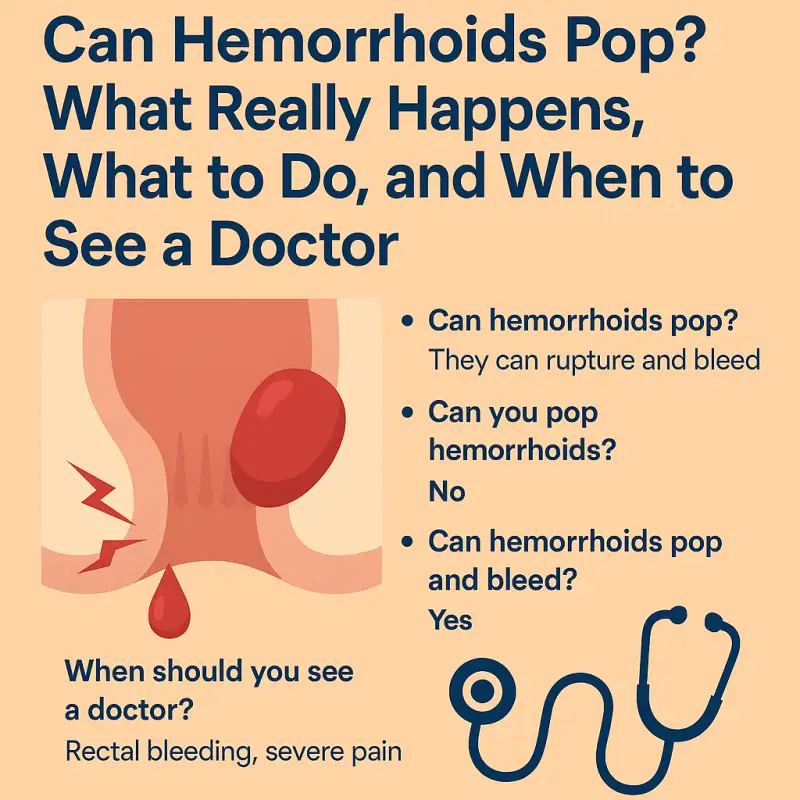TL;DR: Hemorrhoids don’t “pop” like pimples. In severe cases—especially a thrombosed hemorrhoid—an overfilled vein can rupture and bleed. Do not try to pop a hemorrhoid. If bleeding occurs or pain is severe, contact a healthcare professional.
Quick Answers
- Can hemorrhoids pop? They can rupture and bleed in severe cases, but they’re not pimples.
- Can you pop hemorrhoids? No. Attempting to pop one can worsen pain, bleeding, and infection risk.
- Can hemorrhoids pop and bleed? Yes—especially painful, swollen (thrombosed) hemorrhoids may rupture and bleed.
- Can external hemorrhoids pop? External thrombosed hemorrhoids can rupture and bleed; seek medical advice.
- How long can bleeding last? Usually a few seconds to a few minutes—typically less than 10 minutes. Recurrent spotting may follow bowel movements.
What Are Hemorrhoids?
Hemorrhoids (often misspelled “hemroids”) are cushions of swollen tissue and veins in the anal or lower rectal area. They are classified as internal or external. Causes include constipation, straining, pregnancy, aging, heredity, and obesity. Many cases improve over time, but some cause pain or bleeding if not addressed promptly.
Important: Not all rectal bleeding is from hemorrhoids. If you notice blood, see a doctor to confirm the cause and rule out other conditions such as anal fissures or more serious diseases.
“Can Hemorrhoids Pop?”—What That Really Means
People often ask, “can hemorrhoids pop?” While hemorrhoids can rupture and bleed, they do not pop like a pimple. A hemorrhoid is a swollen rectal vein, not a pocket of pus. In severe cases—especially when the hemorrhoid becomes thrombosed (overfilled with blood and very painful)—the pressure can lead to spontaneous bleeding.
When Can a Hemorrhoid Rupture and Bleed?
A thrombosed hemorrhoid (internal or external) is tense, swollen, and very tender. If pressure builds too high, it can rupture and bleed on its own. The days leading up to a rupture are usually marked by intense pain, prompting most people to seek care before a rupture happens—one reason spontaneous “popping” is not commonly reported.
Can You Pop Hemorrhoids?
No—do not pop hemorrhoids. Using a pin, squeezing with your fingers, or otherwise attempting to drain a hemorrhoid can worsen bleeding, increase infection risk, and intensify pain. If your symptoms are severe enough that you’re considering this, call a doctor. If you contact a clinician within 48–72 hours of a thrombosed hemorrhoid forming, they may offer treatments that quickly relieve pain.
Can External Hemorrhoids Pop?
Can external hemorrhoids pop? External thrombosed hemorrhoids can rupture and bleed, but they should never be popped intentionally. Internal hemorrhoids can also bleed (often after bowel movements). Because anal fissures commonly cause bleeding too—especially with constipation—proper evaluation is essential.
How Long Does Bleeding Last If a Hemorrhoid Ruptures?
Bleeding from a ruptured hemorrhoid typically lasts from a few seconds to a few minutes and usually stops within 10 minutes. Minor spotting can recur with bowel movements while the area heals.
What to Do If a Hemorrhoid Bursts
- Apply gentle pressure with clean gauze or tissue to help stop bleeding.
- Try a warm sitz bath (10–15 minutes) for pain relief, hygiene, and to promote healing.
- Keep the area clean and dry; avoid harsh soaps and vigorous wiping.
- Manage pain per your clinician’s advice; avoid NSAIDs if you’ve been told you’re at higher bleeding risk.
- Call your doctor to confirm nothing more serious is going on and to discuss treatment options.
When Should You See a Doctor?
Seek medical evaluation for any rectal bleeding, significant pain or swelling, symptoms that persist or worsen, or if you’re unsure whether it’s hemorrhoids. Other conditions may mimic hemorrhoids—including anal fissures, chronic constipation-related injuries, IBS, and colorectal cancer—so proper diagnosis matters.
Causes and Prevention
Hemorrhoids develop when pressure builds in rectal veins—for example from constipation, straining, prolonged sitting, pregnancy, or weight-related pressure. To reduce risk and flare-ups:
- Resolve constipation: Eat a fiber-rich diet, hydrate well, consider a fiber supplement if advised.
- Avoid straining: Don’t linger on the toilet; respond promptly to the urge to defecate.
- Stay active: Movement supports bowel regularity.
- Pregnancy & older age: These can increase risk; early attention to bowel habits helps.
Both allopathic and homeopathic/herbal approaches are used by some for symptom relief, but professional diagnosis is critical whenever bleeding is present to ensure appropriate care.
Treatment Options
Depending on severity, clinicians may recommend conservative care (fiber, stool softeners, sitz baths, ointments) or office procedures for persistent internal hemorrhoids (e.g., band ligation systems) and other evidence-based treatments. Your provider will help choose the safest path based on exam findings.
FAQs
Can hemorrhoids pop?
They can rupture and bleed in severe cases, but they are not pimples and should not be squeezed.
Can you pop hemorrhoids?
No. Popping increases pain, bleeding, and infection risk; contact a doctor instead.
Can hemorrhoids pop and bleed?
Yes, especially when thrombosed. Bleeding usually lasts seconds to minutes.
Can external hemorrhoids pop?
External thrombosed hemorrhoids can rupture and bleed. Do not attempt to pop them—seek medical advice.
How long does bleeding last after a rupture?
Often <10 minutes, with possible brief spotting during subsequent bowel movements.
What should I do if a hemorrhoid bursts?
Apply gentle pressure, take a warm sitz bath, keep the area clean, and call your doctor.
When is rectal bleeding an emergency?
If bleeding is heavy, won’t stop, you feel faint, or you have significant pain/swelling—seek urgent care.

